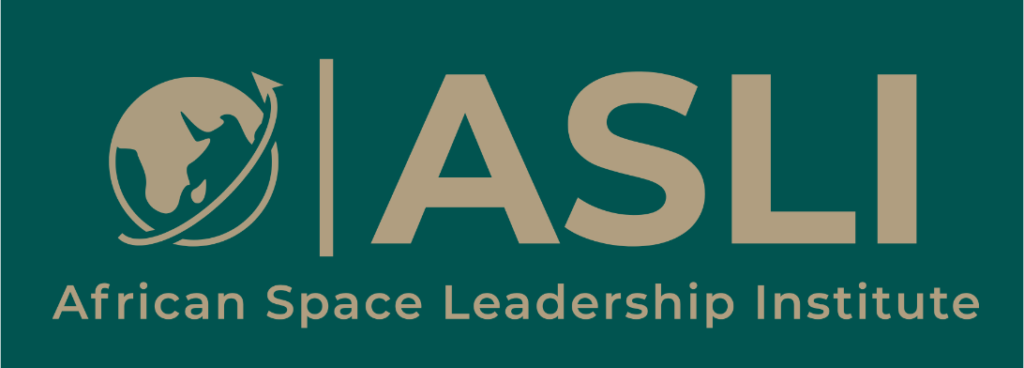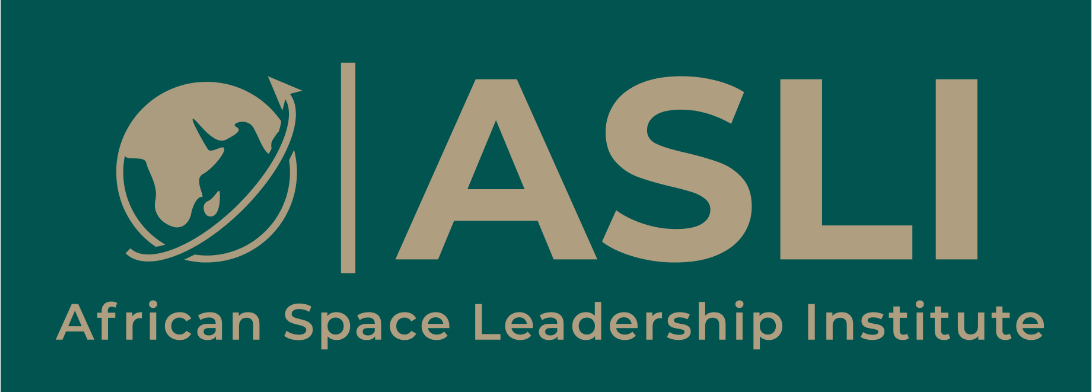Policy Talks
Policy Talks is a high-level engagement session with African and global space leaders.
It is one of ASLI’s flagship programmes in which we discuss national, continental and global space-related issues; how they impact on Africa and how Africa could respond.
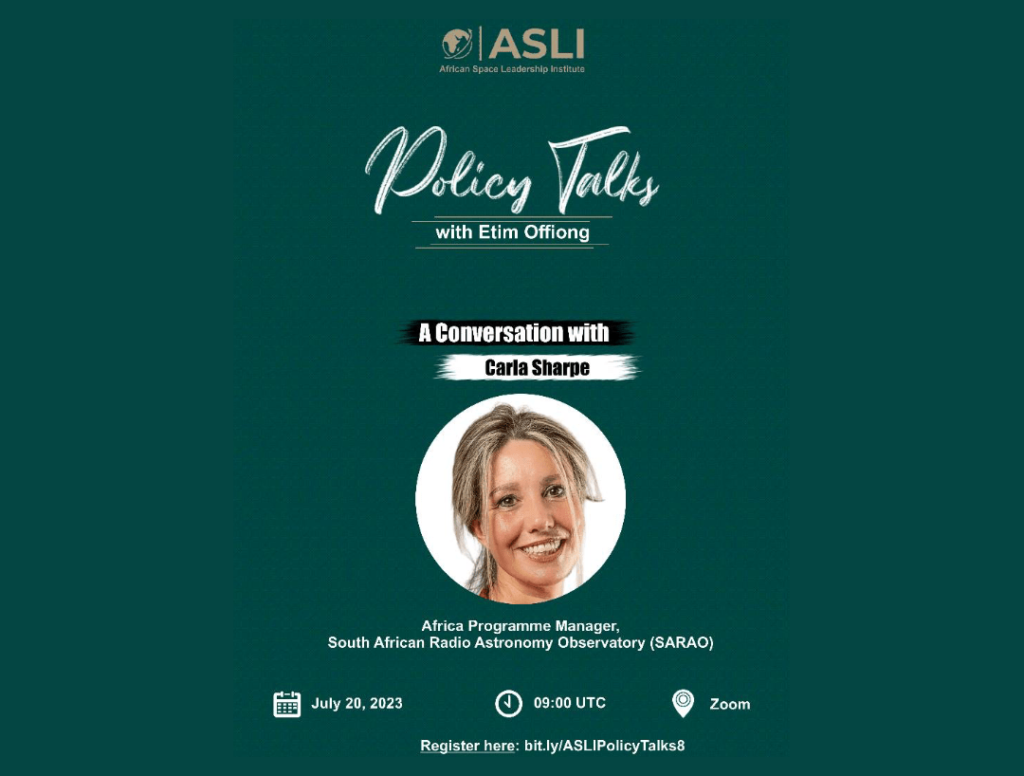
There is a lot of interest in human return to the moon. Several countries and/or space agencies are preparing for moon missions. There are also multilateral cooperative efforts, with different countries trying to lead the different groupings. In 2014, Foundation for Space Development, a private not for profit, non-governmental organisation, conceptualised an inspiring project called Africa2Moon mission. The initiative was aimed at mobilising African talents and resources on a moonshot. What made the Africa2Moon mission experience immense challenges and delays? Is Africa poised to participate in renewed efforts for human presence on the moon?”
Guest Bio
Carla has been with the South African Radio Astronomy Observatory (SARAO) for almost a decade. The SKA is an international effort to build the world’s largest radio telescope, the sheer scale of the SKA represents a huge leap forward in engineering, technology and research & development. She is responsible for planning, negotiating and implementing strategic and funding solutions for the Africa programme across the eight African Partner Countries (APCs), inclusive of the African VLBI Network (AVN) programme, conceptualising and implementing the African Colocation Programme and associated activities.
In 2009 Carla founded the Foundation for Space Development and in 2011, Women in Aerospace Africa, in addition she acts as an adviser to OFF-WORLD.
Her personal passion project was announced in 2014, Africa2Moon, a low cost solution to performing radio astronomy on the far side of the Moon. It has developed to highlight the potential and ability of the African community, and to inspire Africa to “Reach for the Moon” by reaching for the Moon! The telescope will provide scientific insight and importantly first time science. It will be made up of 54 self-inflating radio astronomy balls, each representing a nation in Africa. As a continent, Africa is yet to work on an inclusive, multi-national space program that enables Africa to highlight our potential and capabilities in science, technology, engineering and innovation.
Following the completion of a degree in Finance and Economics from the University of Cape Town, Carla graduated from the International Space University’s (ISU) first Executive MBA Programme in 2010, and has subsequently become a member of the International Institute for Space Law and a Governing Member of ISU. Carla has authored chapters for books and collaborative studies on space economics and policies.
She is currently completing her PhD from UCT Spacelab. The topic of her research is to reliably determine the socioeconomic benefits to be gained from public investment into space science and technology programmes in developing nations, and the sustainable level and nature of investments that would optimise these benefits.
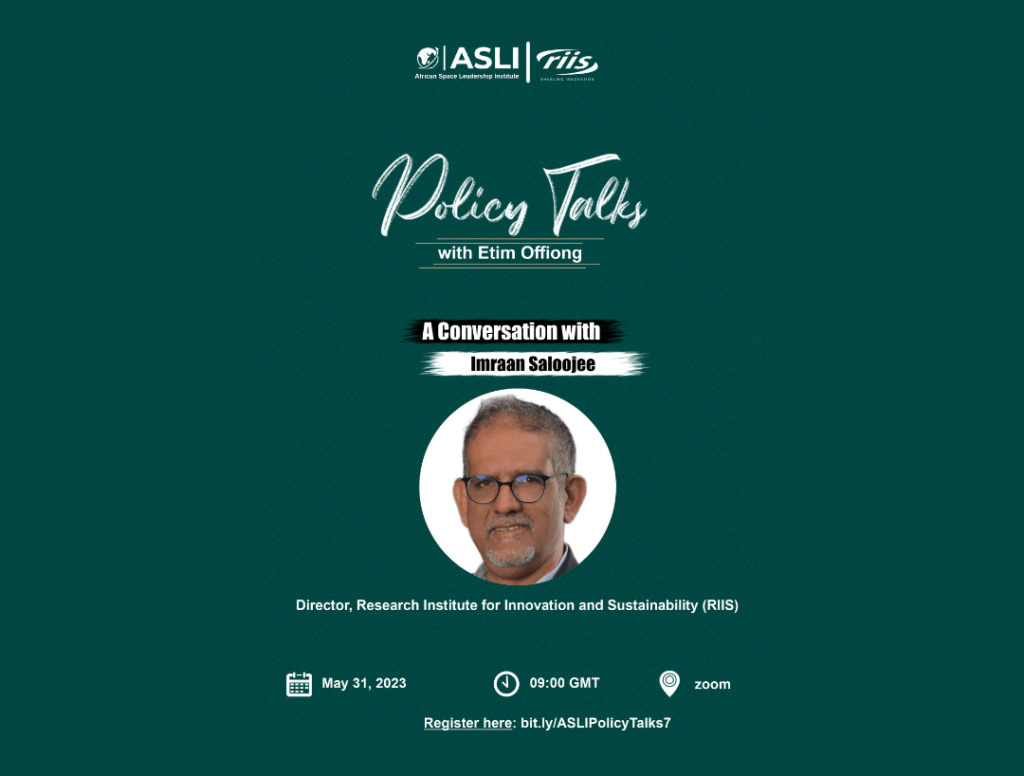
Imraan Saloojee joins us to discuss his journey in developing policies, strategies and innovative programmes in the Earth observation space.
Guest Bio
Imraan Saloojee is the Director at the Research Institute for Innovation and Sustainability (RIIS), a leading management and innovation consultancy focused on driving long-term sustainability through radical changes in how businesses and society innovate.
Imraan’s background includes serving as Chief Sector and Business Developer at the South African National Space Agency, where he oversaw SANSA’s EO business development. He also was a member of the African Union Commissions Space Working Group that developed the African Space Policy and Strategy.
Prior to his work with SANSA, Imraan spent 14 years at the Department of Science and Technology, most recently as the Director for Earth Observations. During this time, he was seconded to the Group on Earth Observation Secretariat in Geneva, where he was responsible for driving the capacity-building programme. Imraan has also represented South Africa at the OECD’s working group on Science and technology indicators. Imraan also has a background as a Rock Mechanics Engineer at Placer Dome Weston Areas.
Play Event
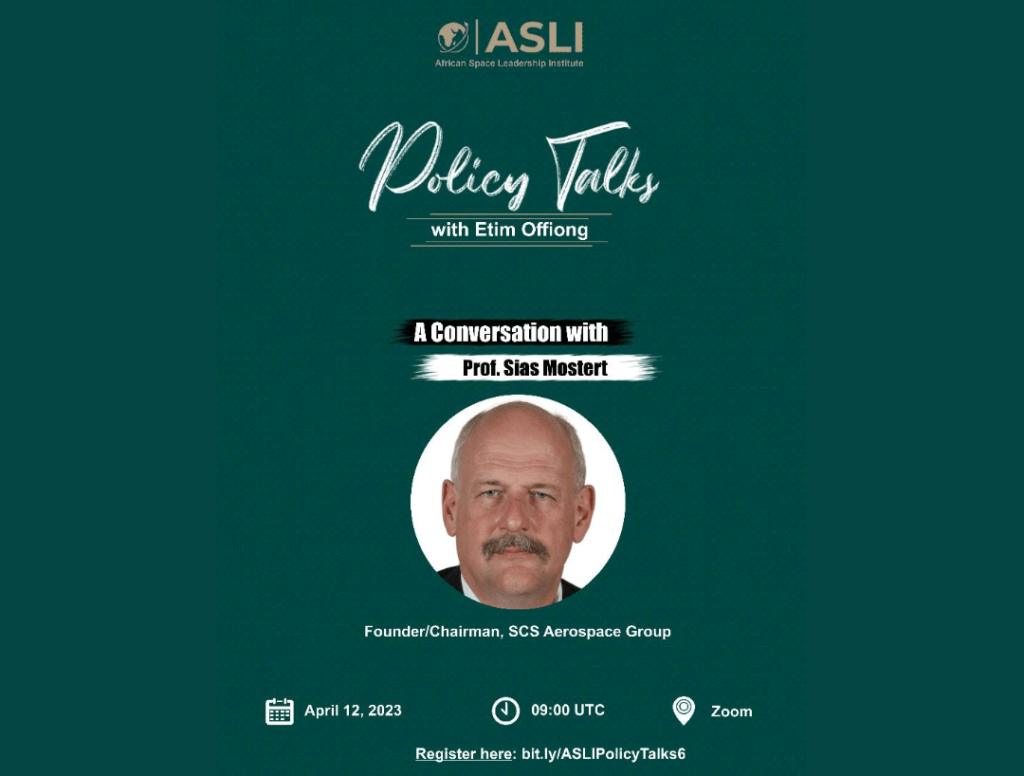
While several African countries procured satellites from foreign companies or universities, South Africa chose to follow the path of designing and building satellites locally. The first product of this effort was SUNSat which was launched in 1999. From this initial effort, other satellites have been developed locally and launched including SumbandilaSat, TsepisoSat and the Marine Domain Awareness (MDA) satellite constellation. Several private companies have also spun off with capabilities to build satellite systems and subsystems. Their customers come from the USA, Asia, Middle East and Europe.
Our guest is Prof. Sias Mostert, Founder/Chariman, SCS Aerospace Group.
He joins us to share lessons from the South African experience of building a space ecosystem through engaging the academia and industry. He will also share on the lessons learned from the formation of the African Resource Management satellite Constellation (ARMC).
Guest Bio
Prof. Sias Mostert has more than 30 years of experience in developing space craft and upstream- and downstream space enterprises. He started his career at Stellenbosch University as junior lecturer and became the Development Manager on the Sunsat program. He become a professor in 2001. He went on to be a co-founder of a number of downstream and upstream companies in the global space supply chain. Today he is working on developing constellations that are prioritised around the needs in Africa, but accessible in the global market. Prof. Mostert has a PhD from Stellenbosch University, an EMBA from Cape Town University and completed the International Space University SSP in 1992. He is a member of the Board of Trustees of African Association of Remote Sensing.
Play Event
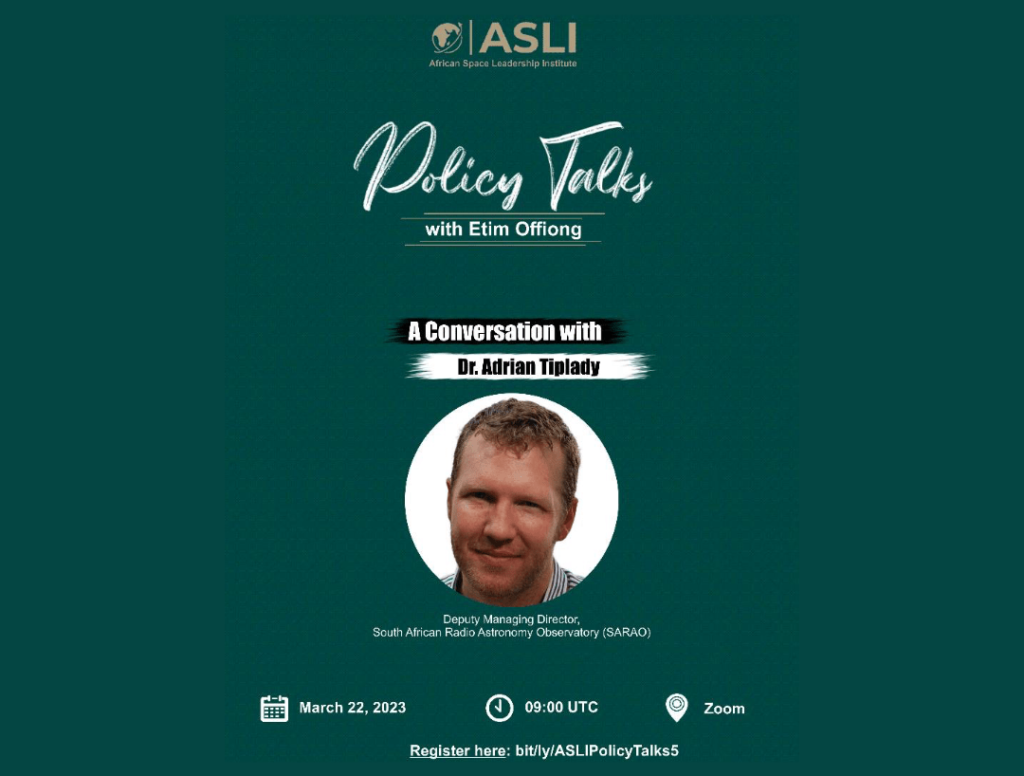
South Africa has a strong space heritage with deep roots in astronomy. Beginning with the Royal Observatory at the Cape of Good Hope, which was established in 1820, South Africa now boasts of several observatories, some of which are used to support current space missions of international clients, including the UAE and U.S. More recently, South Africa won the hosting right for a large part of the Square Kilometer Array (SKA), which will be the largest and most powerful radio telescope in the world when completed. Also, in 2024, South Africa will host the General Assembly of the The International Astronomical Union (IAU), the first time the meeting will be held in Africa since the founding of the organisation in 1919. To strengthen its local expertise, facilities and capabilities, the South African government enacted the Astronomy Geographic Advantage Act in 2007. What real advantage has the Act contributed to the South African economy and technological capability?
Joining us to discuss this and related issues, is Dr. Adrian Tiplady, Deputy Director, South African Radio Astronomy Observatory (SARAO).
Guest Bio
Dr Adrian Tiplady holds a PhD in radio astronomy, with degrees in telecommunications, physics and electronics, computer science and musicology. He joined the South African Square Kilometre Array (SKA) project in 2005 as a project scientist, and currently holds the position of Deputy Managing Director: Strategy & Partnerships at the South African Radio Astronomy Observatory (SARAO) – which currently operates the South African MeerKAT radio telescope. After preparation of the successful 2011 African bid to host the international SKA project, Adrian supported the South African government in negotiating the establishment of the SKA Observatory (SKAO)- an intergovernmental treaty organisation tasked to construct and operate the SKA telescope. At the same time, he drove various programs to ensure readiness for hosting of the SKA in Africa, including the establishment of a uniquely protected radio astronomy reserve in South Africa, and radio astronomy capacity in African partner countries. More recently, Adrian led an expert task team in the development of the draft South African National Open Science Policy. Adrian is an invited member of the European Science Foundation expert Committee on Radio Astronomy Frequencies, and the international Scientific Committee on the Allocation of Frequencies for Radio Astronomy and Space Science.
Play Event
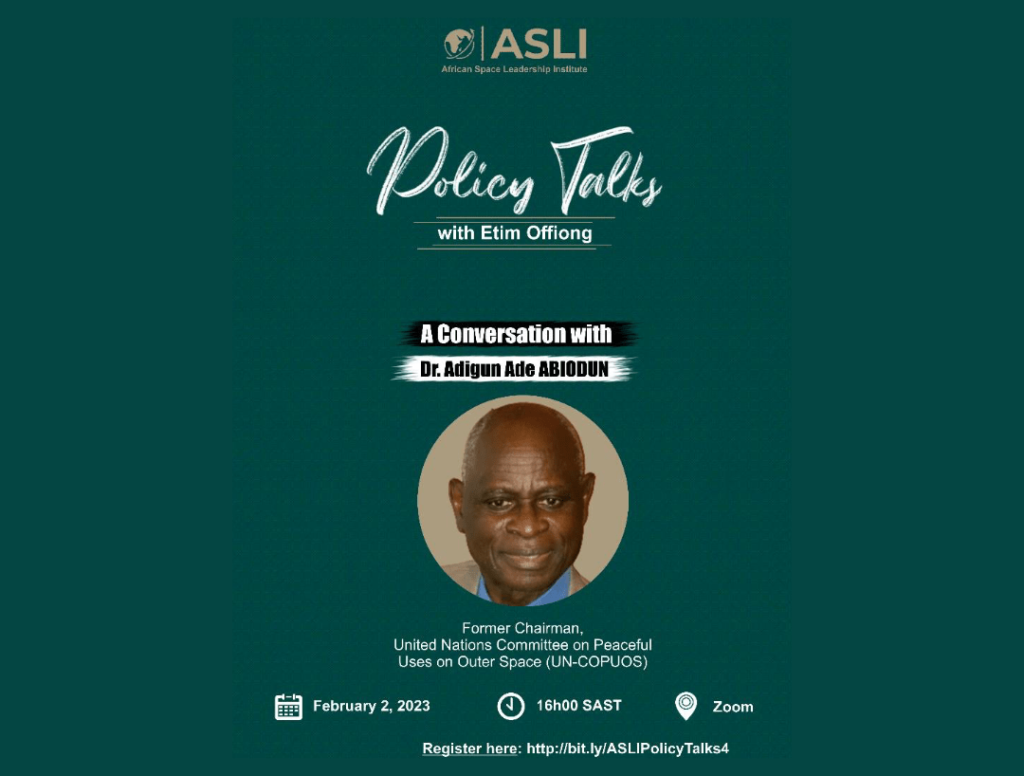
Since its founding in 1958, the UN COPUOS meets annually to promote international space cooperation as well as peaceful uses of outer space. In March 1962, COPUOS established two subcommittees – the Scientific & Technical and the Legal subcommittees – and these two subcommittees have also been meeting annually since their establishment. As their names suggest, the Scientific & Technical focuses on the scientific and technological aspects of space exploration, while the legal subcommittee focuses on the legal and ethical issues that arise from space exploration. How have African countries fared in the evolving space co-opetition among Member States of COPUOS and its subcommittees?
Join us on 2nd February 2023, for a conversation with Dr. Adigun Ade ABIODUN.
Guest Bio
Adigun Ade ABIODUN was educated in Nigeria, the USA and Canada. He obtained his Ph.D. in 1971, in civil engineering from the University of Washington, Seattle, Washington, USA, and was a post-doctoral research fellow at the Canada Centre for Remote Sensing in Ottawa, Canada, from December 1974 – February, 1976.
His professional experiences included his services as a hydraulic engineer with the US Army Corps of Engineers, in Seattle, as a system engineer at the Boeing Company, in Seattle; Snr. Lecturer at the University of Ife, (since renamed Obafemi Awolowo University), and as United Nations Expert on Space Applications from 1981 November to 1999 September, when he retired from the services of the United Nations. Thereafter, he was appointed by the Secretary-General of the United Nations as a Member of the College of Commissioners of the United Nations Monitoring, Verification and Inspection Commission on Iraq (UNMOVIC), (2000-2007). He also served concurrently as the Senior Special Assistant (to the President of Nigeria) on Space Science and Technology (March 2000 – May 2003). He was elected and served as the Chairman of the United Nations Committee on the Peaceful Uses of outer Space – COPUOS (June 2004 – June 2006). He also served as one of the 20 global panelists that explored, in June 2006, Humans and Space: The Next Thousand Years, at the Foundation for the Future, Bellevue, State of Washington.
Among other things, Ade ABIODUN initiated and co-founded the African Association of Remote Sensing of Environment (AARSE), and the African Space Leadership Conference (ASLC). He was Board Member of the Space Generation Advisory Council and a Trustee of the International Society for Photogrammetry and Remote Sensing (ISPRS). He served as Chairman of the Board of Directors, Space Week International Association-SWIA, and also served as a member of the African Union Space Working Group.
Ade ABIODUN has lectured and published extensively on different aspects of space science and technology. He is the Founder of the African Space Foundation (ASF), a co-founder of the African Space Leadership Institute (ASLI) and the author of Nigeria’s Space Journey – Understanding its Past, Reshaping its Future.
Play Event
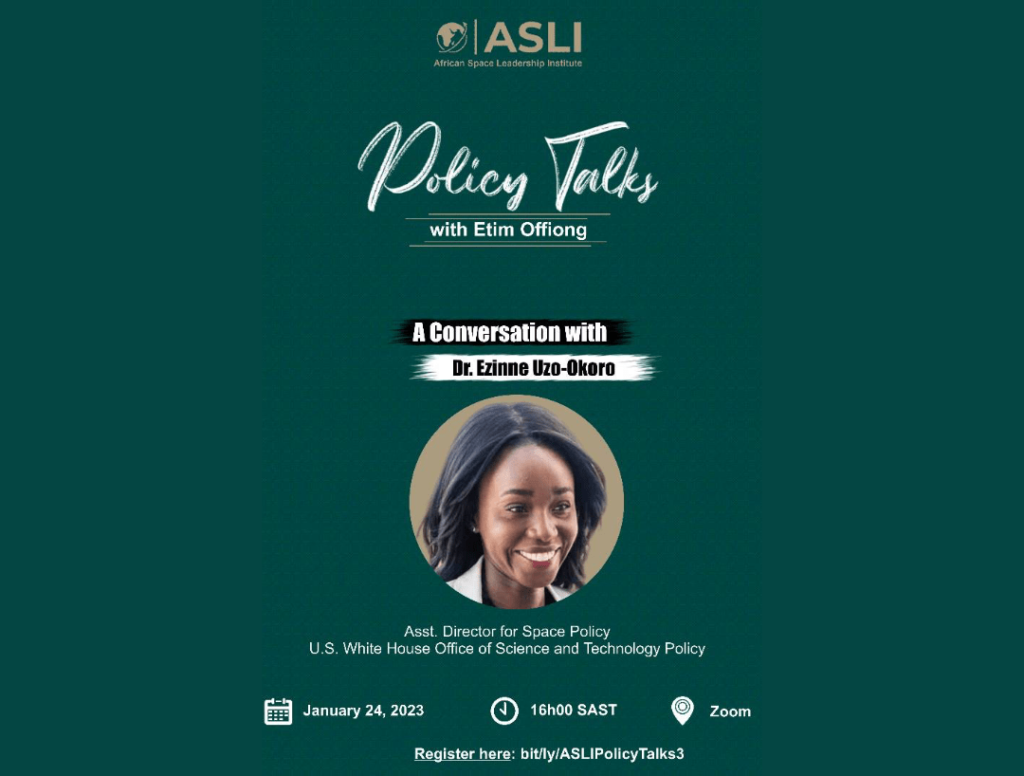
Dr Ezinne Uzo-Okoro discusses her work in developing national policies, strategies and implementation plans for the commercial and civil space portfolio. She also discussed the outcome and implementation plan for the recent U.S.-Africa Space Forum that was held in December 2022.
Guest Bio
In 19 years of U.S. government service, Dr. Uzo-Okoro has developed several national space policies and contributed to over 60 NASA missions and programs – as an engineer, technical expert, manager, and executive – in space science and technology topics. At the White House, she leads the civil and commercial space portfolio, which includes Earth Observations, Orbital Debris, Microgravity, Space Weather, In-space Servicing Assembly and Manufacturing, Aeronautics, Planetary Protection, human exploration, and space science. Dr. Uzo-Okoro released policies including an In-space Servicing, Assembly, and Manufacturing (ISAM) National Strategy, National Strategy for Advanced Manufacturing, National Orbital Debris Implementation Plan, and the U.S. Government Commercial Earth Observations Data Purchase Plan. Her 17-year engineering career spanned contributions to earth observations, planetary science, heliophysics, astrophysics, human exploration, and space communications missions, which represent over $9.2 Billion in total program value to NASA. She has an undergraduate degree in Computer Science from Rensselaer Polytechnic Institute, and three masters degrees in Space Systems, Space Robotics, and Public Policy from Johns Hopkins University (APL), MIT (the Media Lab), and Harvard University. She earned her doctoral degree in Aerospace Engineering from MIT. Her story is profiled in President George W. Bush’s book, Out of Many, One.
Play Event
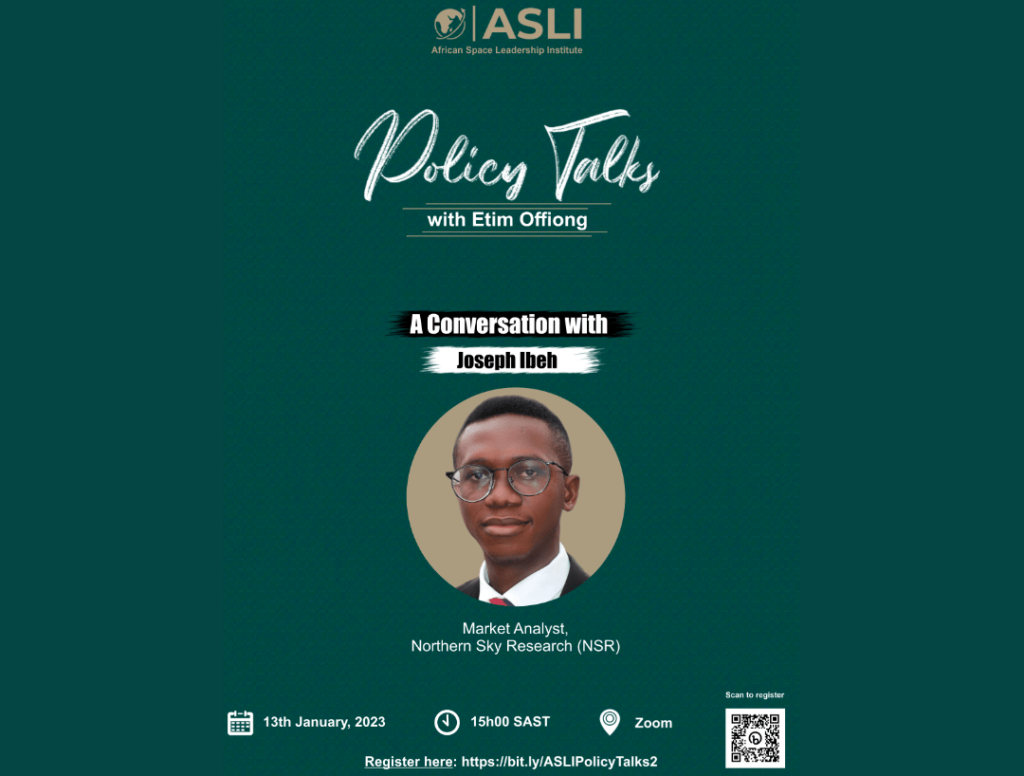
In the first edition of Policy Talks in 2023, Mr. Joseph Ibe joins us to review space policy and activities in Africa, in 2022. We take a bird’s-eye view from the Decisions of the Assembly of the African Union (AU) in February, to the outcomes of the US-Africa Leaders Summit in December.
Mr. Ibe also shares his thoughts on what to expect in 2023, within and outside Africa.
Guest Bio
Mr Joseph Ibeh is a market analyst at NSR covering satcom finance, satellite capacity pricing and inflight connectivity research. Mr Ibeh has over three years of experience in market research, due diligence, financial analysis and strategy, focusing on the space industry. Before joining NSR, Mr Ibeh was a Senior Analyst at Space in Africa, covering all segments of the African commercial space industry and national space programs. He co-authored the African Space Industry Annual Reports and the NewSpace Africa Industry Reports and provided business advisory to global space companies looking to enter the African market.
Play Event
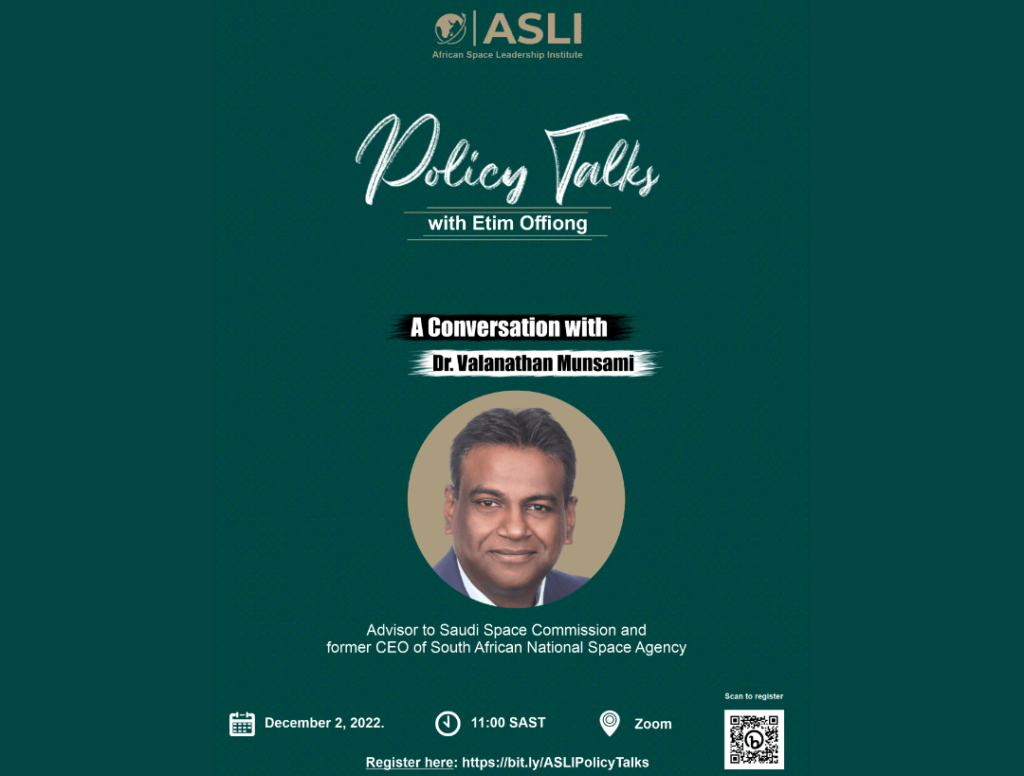
Dr. Munsami was the Chair of the African Union Space Working Group (AUSWG) that developed the African Space Policy and Strategy. The instruments were adopted by the African Heads of States and Governments in 2016. Subsequently, the African Space Agency (AfSA) was established in 2018, with the hope that it will become operational in 2023. It is about seven years since the adoption of the policy and strategy instruments; are they due for a review? What is the status of the domestication and implementation of the instruments, at national and continental levels? Have the instruments been effective in the decision-making, programmes and partnerships of the African Union?
Guest Bio
Dr Valanathan Munsami holds a PhD in Physics, a Masters of Business Leadership, a Space Studies Program Diploma, and a Certificate in International Air, Space and Telecommunications Law. He worked in South Africa’s Secretariat for the non-proliferation of weapons of mass destruction, managed the implementation of a suite of bilateral and multilateral science and technology agreements, involved in the development of South Africa’s National Space Strategy and National Space Policy, and oversaw the establishment of the South African National Space Agency (SANSA). On winning the bid in 2012 to co-host the Square Kilometer Array (SKA), the biggest radio astronomy project in the world, he became the Chief Specialist for Astronomy and African Space Science. In this role, he led the development of South Africa’s Multi-Wavelength Astronomy Strategy and the SKA Readiness Strategy for Africa, and conceptualized the model for the Pan African Space Science University of the African Union. He also chaired the African Union Space Working Group, which was tasked with the development of the African Space Policy and the African Space Strategy that was approved by the African Union Heads of State in January 2016, and also facilitated the Implementation Plan for the African Union Science, Technology and Innovation Strategy for Africa (STISA). He was the Chief Executive Officer (CEO) of SANSA for five years, ending in February 2022. He was also a member of the South African Council for Space Affairs (SACSA) and Vice President of the International Astronautic Federation. He is inducted as an academician of the International Academy of Astronautics (IAA) and sits on the Advisory Boards of the Space Generation Advisory Council (SGAC) and ZASpace Inc. (the Space Industry Forum of South Africa). He is currently the Chancellor of the International Space University, based in Strasbourg, France, a co-Founder of the African Space Leadership Institute, and most recently appointed as an Advisor to the Saudi Space Commission.
Play Event
Policy Talks Schedule
| Mon | Tue | Wed | Thu | Fri | Sat | Sun |
|---|---|---|---|---|---|---|
|
1
|
||||||
|
2
|
3
|
4
|
5
|
6
|
7
|
8
|
|
9
|
10
|
11
|
12
|
13
|
14
|
15
|
|
16
|
17
|
18
|
19
|
20
|
21
|
22
|
|
23
|
24
|
25
|
26
|
27
|
28
|
